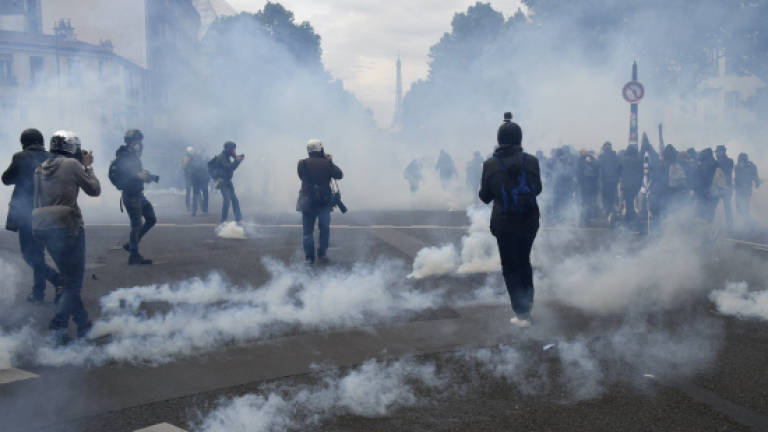Eiffel Tower shut as French demos cloud Euro 2016

PARIS: Strikes closed the Eiffel Tower and disrupted transport in France on Tuesday as tens of thousands prepared to march against labour reforms with the Euro 2016 football championship in full swing.
With football fans from around Europe travelling to France for the month-long tournament, the Eiffel Tower management announced the capital's best-known landmark would be closed "due to the national strike".
The strike is the latest in months of industrial action that has seen air and rail transport severely disrupted, fuel shortages and rubbish piled up on the streets of Paris.
And with the nation on high alert over the threat of terrorism during the Euro 2016 tournament, overstretched security authorities also fear the demonstrations to kick off later Tuesday could turn violent.
The terrorism threat was brought back into the spotlight after a man claiming allegiance to Islamic State jihadists killed a policeman and his partner at their home in a northwestern Paris suburb late Monday.
Last stand?
The latest in a wave of protests that began in March coincides with a French Senate debate on the reforms, aimed at making the job market more flexible but which critics see as too pro-business.
The reforms aim to rein in France's stubborn 10% unemployment rate by making it easier for employers to hire and fire workers, but detractors say it undermines job security.
President Francois Hollande's Socialist government hopes the latest day of protest, centred on Paris, will be a last stand for the movement.
But Philippe Martinez, secretary-general of the far-left CGT union that has spearheaded last month's blockades of fuel depots and an ongoing rail strike, predicted a "very strong mobilisation".
The CGT has laid on more than 600 buses to transport demonstrators to Paris.
Paris police chief Michel Cadot said he expected "maybe more than 50,000 demonstrators" in the capital. Authorities have banned around 130 people suspected of being troublemakers.
With Euro 2016 already shining the international spotlight on France, Tuesday's demonstrations will have a higher profile, especially if they descend into clashes between demonstrators and police like several previous protests.
Security forces are already stretched to maintain order at the football venues — failing dramatically in Marseille on Saturday when fan violence left 35 supporters injured, three seriously, in the worst violence at an international tournament in years.
Two further protest days are set for later this month.
Street protests against the labour reform kicked off on March 9, culminating in massive demonstrations on March 31 that brought hundreds of thousands onto the streets.
Tourism hit
At a time when the French capital would normally be reaping the benefits of high-season tourism boosted by the football, the demonstrations have dampened the flow to the world's most-visited city.
Several staff at the Eiffel Tower went on strike, leaving insufficient numbers to open the monument safely, according to its operator, Sete.
Adding to the climate of discontent, rail workers launched strike action to protest working conditions. They were joined at the weekend by a minority of Air France pilots.
The pilots' strike, which affected about one in five flights according to the airline, is set to end Tuesday but the rolling strike at national rail company SNCF marked its 14th day Tuesday.
The actions have further depressed France's tourism sector, already hit by the November jihadist attacks in Paris.
Watered down
The government sparked fury when it forced the contentious reforms through parliament without a vote.
The opposition-dominated Senate is expected to push for changes more favourable to employers and will wrap up its debate on June 24, with a vote four days later.
If the two houses of parliament fail to agree on the legislation, the lower house will have the final say — and Prime Minister Manuel Valls could again ram the bill through.
While rejecting unions' demands to withdraw the bill, the government has watered it down, notably by scrapping a cap on severance pay.
The CGT has signalled it may drop its demand for an outright withdrawal of the bill, instead pushing for the removal of a key clause allowing agreements negotiated between companies and their staff to take precedence over sector-wide deals reached with unions.
Hollande, who faces a re-election bid next April, had hoped the signature reform would reverse his approval ratings, which are among the worst of a modern French leader. — AFP